Supporters Like You
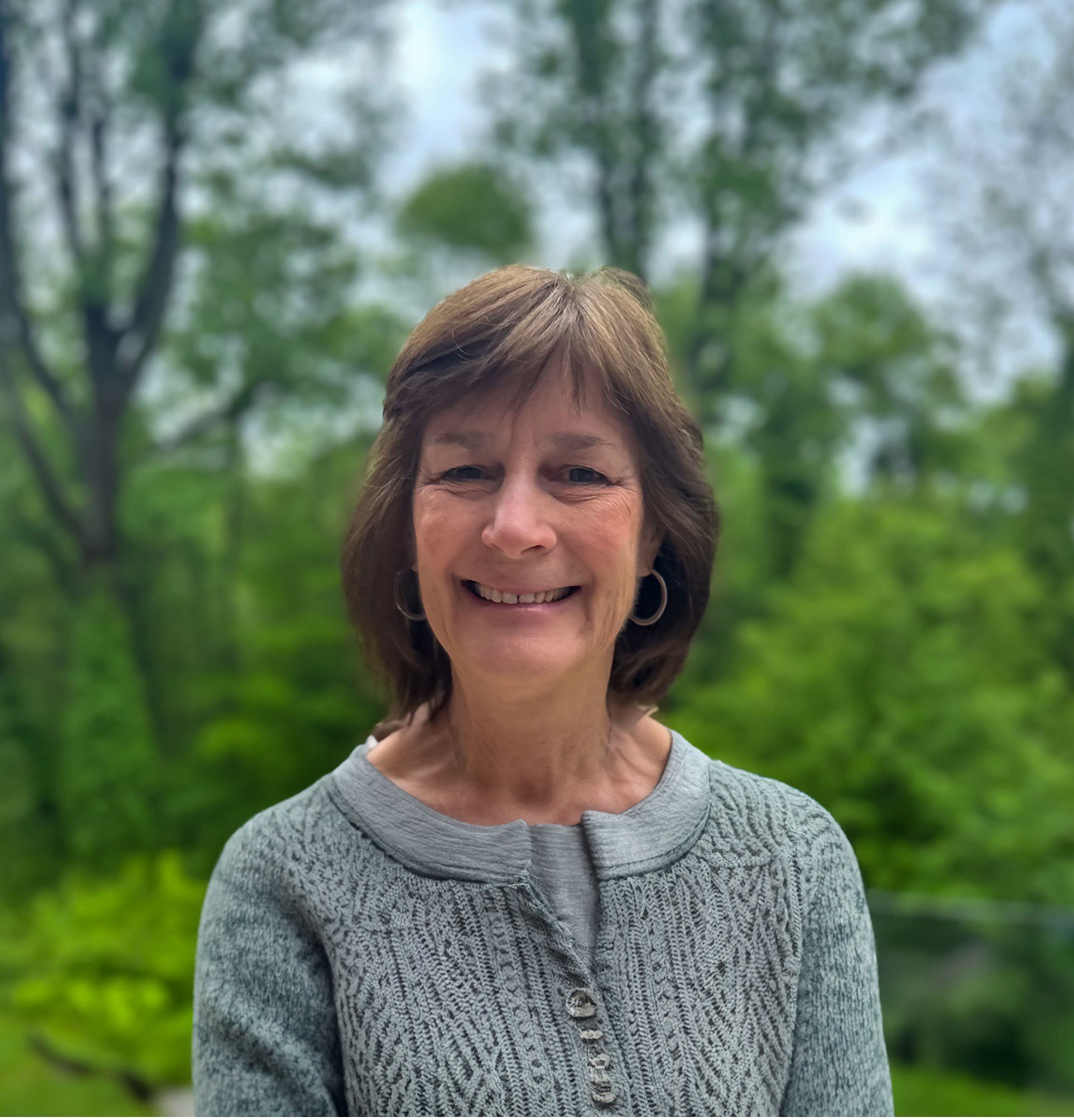
Betsy Lowe ’76: My Skidmore Story
Longtime donor enjoys staying in touch with the College that initially rooted her in her career path
Read more of her story
I had a wonderful overall experience attending Skidmore College. I was accepted at several liberal arts colleges that I had applied to at the time, but was drawn to Skidmore not only as being a high quality liberal arts college, but its beautiful campus and outdoor spaces, its location in Saratoga Springs, and the opportunities it provided for exchange programs and studies abroad, etc. Being a liberal arts college, it also gave me opportunities to explore a variety of interests. I ended up getting a double major in biology and music, with biology leading to my future career, and the music and associated piano playing late at night as a way to relax after a full day of classes and studies, etc. on campus as well as its role in keeping me relaxed. I also enjoyed the opportunity to do a January term in Madrid, Spain followed by some travels around Europe, and a January term at Wells College, my mother’s alma mater, which broadened my overall experiences and perspectives in life leading to my passion and career in environmental conservation. I initially worked for the Ralph Nader Public Interest Research Group in Boston (MassPIRG), followed by graduate school at Cornell University where I got my Master’s Degree in Regional Planning focused on natural resources, and then a career with the New York State Department of Environmental Conservation for approximately 25 years and becoming the NYS DEC Region 5 Director covering of a large portion of northern New York and the Adirondacks. All of these experiences at college and throughout my career as well as with nature in many ways over time led to my idea and founding of the “Natural History Museum of the Adirondacks” now known as “The Wild Center” in Tupper Lake, NY – a 40,000 square foot natural history museum in the central Adirondacks which opened in 2006 with the support from over 6,000 donors. It has been great to stay in touch with the Skidmore College that initially rooted me in my career path and to see it evolve over time – adding to my interest in continuing to support the College and all its possibilities in the future.
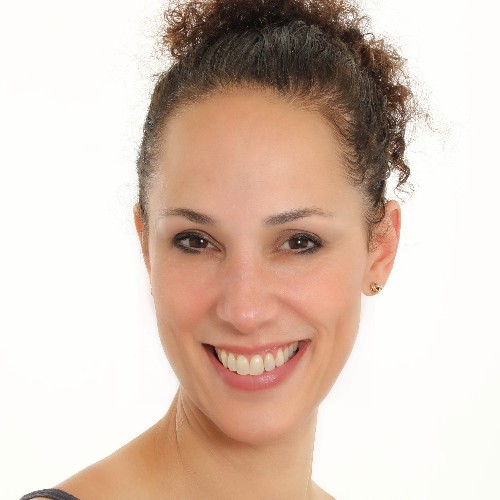
Melissa Kotlen ’92: A Proud Skidmore Alumna
For 31 consecutive years, Melissa has remained a loyal donor and dedicated volunteer, demonstrating an unwavering commitment to the college and its community.
Read more of her story
For Melissa Kotlen ’92, Skidmore College has always been more than just her alma mater—it’s the place that shaped her path, introduced her to lifelong friends, and inspired her to give back. For 31 consecutive years, Melissa has remained a loyal donor and dedicated volunteer, demonstrating an unwavering commitment to the college and its community.
Melissa’s Skidmore journey began in high school when a substitute teacher, a proud Skidmore alumna, spoke about the college with such enthusiasm that it piqued Melissa’s curiosity. One campus tour later, she was hooked – connecting instantly with the students, admiring the professors, and falling in love with the college’s vibrant atmosphere. “On the tour, I knew within minutes that Skidmore had to be my home,” she said.
As a student, Melissa fully embraced the Skidmore experience. Whether tutoring French, volunteering in the community, or serving as a House Counselor and RA, she was always eager to get involved. She attended concerts, movies, and all other campus events, making the most of every moment. One of her most cherished memories? Winning Scrib Sync with her friends by lip-synching as The Brady Bunch—a victory forever preserved on VHS!
After graduating with a double major in French and English, Melissa took an unexpected turn into the medical field, earning her second bachelor’s degree in nursing, becoming a Labor & Delivery RN, and becoming a board-certified lactation consultant with a thriving private practice. She credits Skidmore’s “Creative Thought Matters” philosophy for teaching her to think critically and pursue a career beyond what she initially imagined. “It’s been such a journey, and I credit Skidmore every single day.”
Melissa’s commitment to Skidmore is unwavering. She has served as a reunion volunteer for many years and previously supported the college as a Regional Club President in Chicago and NYC. Her philanthropy stems from deep gratitude—she believes Skidmore provided the foundation for her success and wants future generations to have the same opportunities.
“I have watched Skidmore evolve tremendously–from its campus and diverse student population to its academic accolades and its incredibly brilliant alumni base—and it continues to impress me every day,” she said. “Keep on keepin’ on! So proud to be part of it.”

Judith Harmon Miller ’60: My Skidmore Story
For nearly 65 years, Judy has given back to Skidmore College as a donor and volunteer—not out of obligation but from deep gratitude. Skidmore set her on her path, shaping the person she became and reinforcing the values she learned as a child.
Read more of her story
As the first in her family to earn a college degree, Judy arrived at Skidmore certain of what the future would hold: love, marriage, and teaching high school. She had originally set her sights on other colleges, but when two hometown friends encouraged her to apply, she happily found herself at Skidmore, which would challenge and inspire her in ways she never expected.
She credits Skidmore’s exceptional faculty and administration with delivering a transformative education. As a history major, she was guided by professors like Alice Warren, Grace Cockroft, and Henry Galant, as well as by Dean Norma McCurry and President Val Wilson, who treated their female students as serious scholars and encouraged them to engage deeply with ideas. They aided in developing Judy’s confidence in her intellectual abilities, helping her to realize that she could trust in her capacity to form ideas and to advocate for those ideas, even in controversial circumstances.
Judy went on to earn her master’s degree at Harvard University and dedicated her career to education as a public school teacher before earning her doctorate at the University of Massachusetts and educating teachers at colleges across Vermont.
Beyond academics, Skidmore gave Judy leadership opportunities that reinforced her commitment to democratic principles. As head of the Honor Board her senior year, she took on this college government position because it was committed to shared governance and personal responsibility.
Perhaps most significantly, at Skidmore, she formed lifelong friendships, including one friend who became a neighbor after Judy retired. In her first-year dorm, she met four women who have remained a constant in each other’s lives, connecting via Zoom regularly, attending reunions together, and supporting one another through life’s ups and downs.
Judy traces her success to Skidmore. That’s why she continues to give back—in gratitude for the strong foundation Skidmore provided.

Emily Pavlovic chiles startz ’74
Longtime donor and alumna Emily Pavlovic Chiles Startz ’74 honored her 50th reunion with a generous contribution. Through a $1 million bequest commitment, she has established the Emily Pavlovic Chiles Startz ’74 Endowed Fund to Support Dialogues Across Differences.
Read more of her story
I am proud to be a longtime donor supporting our alma mater with leadership gifts through the Skidmore Fund. I also recently established an endowed scholarship fund, “Texans for Skidmore.” This was especially important and meaningful to me given the financial aid I received as a student.
My 50th Reunion was this past spring and I was excited to honor this milestone with a special gift to Skidmore:
Through a $1 million bequest commitment, my estate will fund, in perpetuity, the Emily Pavlovic Chiles Startz ’74 Endowed Fund to Support Dialogues Across Differences. This Fund will provide unequivocal financial support for speech and expression, civil debate and broad intellectual inquiry – all hallmarks of a robust liberal arts education – as well as fund projects and experiences that foster a balance of perspectives.
In addition, my annual gifts through the Skidmore Fund enable me to see the initial efforts during my lifetime.

Mandy Santiago ’95
“Joining the Legacy Society was a simple way for me to express my gratitude for all that Skidmore has given to me, and to ensure the College exists in perpetuity to serve the next generation of students.”
Read more of her story
As a director of philanthropic communication and grants for a nonprofit healthcare organization, Mandy Santiago ’95 believes in the importance of philanthropy and its impact on advancing an institution’s mission. Her first experiences with mission-driven work were through Skidmore College — experiences that would influence many of her personal and career aspirations.
Mandy first learned about Skidmore through her high school guidance counselor, at a time when she was interested in pursuing early elementary education. Though the early elementary program had been discontinued by the time she arrived on campus, the circumstance provided Mandy with an opportunity and a key first lesson at Skidmore: always explore.
“Being a lifelong learner, keeping an open mind, and embracing change are the hallmarks of a Skidmore education, in my opinion,” Mandy shared. “The analytical, research, and communication skills I honed, along with the relationships I developed during my undergraduate experience, have served me well.”
During Mandy’s first year, she dove into exploring all Skidmore had to offer — from a mixed roster of courses that included both drawing and biology, to learning from the different cultures and perspectives within the campus community. Skidmore became a home where she could embrace new ideas and foster her curiosity.
Mandy’s experience was made possible by financial aid. “I was incredibly fortunate to receive a generous financial aid package,” she reflected. “I remember opening my award decision letter and knowing someone gave a gift that would change my life.”
Now, committed to paying it forward, Mandy is both an annual donor to the Skidmore Fund and a member of the Legacy Society, a community of supporters with planned gift commitments.
“Joining the Legacy Society was a simple way for me to express my gratitude for all that Skidmore has given to me, and to ensure the College exists in perpetuity to serve the next generation of students,” Mandy said. “I know my gifts support fearless thinkers, creators, and problem solvers whose curiosity to understand the interconnected world around them will help drive innovation across disciplines and industries in the future.”
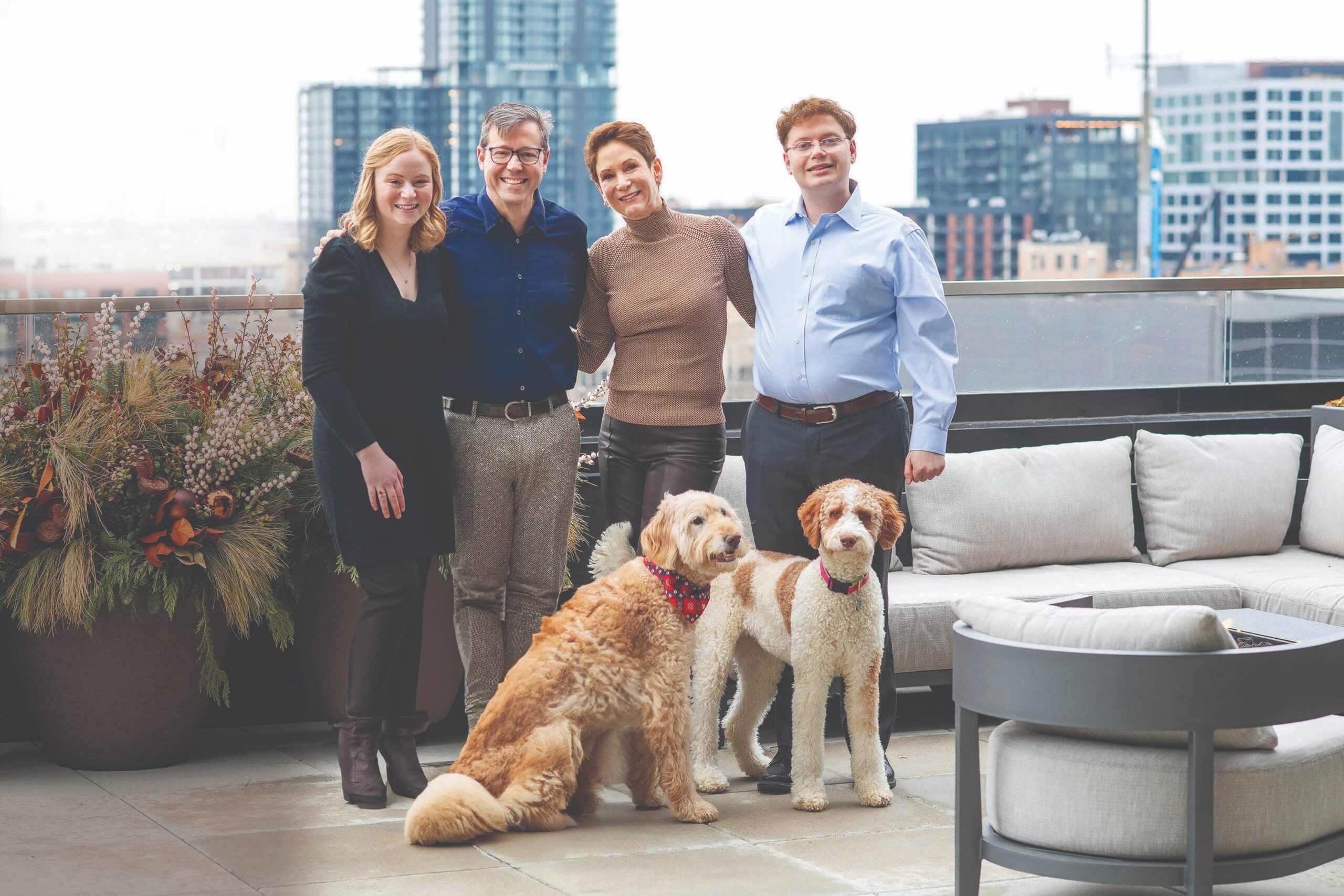
Katie Riker Sternberg ’90
“At Skidmore, I recognized my intellectual power. It has been important to me to give back — to provide current and future Skidmore students with the intellectual and creative building blocks the College provided to me.”
Read more of her story
By: Katie Rocque
How do you think creatively to support the communities and causes you care most about?
For Katie Riker Sternberg ’90, an executive leadership coach and loyal Skidmore Fund donor for many years, creative thought has meant thinking about how she can continue to make a lasting impact on student learning experiences at Skidmore while also supporting individuals with autism — a cause that transformed her family’s life.
Sternberg and husband Erich, an insurance executive, grew up actively participating in the religious and educational communities their families were part of. Contributing time, talent, and treasure is a commitment that remains important to their family; today, much of their focus is on making a meaningful difference in the autistic community.
In 2001, their then 3-year-old son, Jake, was diagnosed with autism; their daughter, Hallie, was a newborn. At the time of Jake’s diagnosis, the family was living in Louisiana, where few support services were available. In true Skidmore fashion, Sternberg took action, learning about different treatment options and therapy services so she and Erich could begin building a support network of their own. As Jake grew older and the Sternbergs discovered what it took to help him succeed, one thing became clear: Talented, passionate, and qualified support and medical professionals are essential. Today, the Sternbergs’ relationship with Skidmore draws on the family’s deep commitment to supporting the autistic community.
In 2021, the Sternbergs created the Katherine Riker Sternberg ’90 and Erich Sternberg Fund for Clinical Field Experience and Community Engagement at Skidmore. The fund supports experiential learning opportunities for psychology students who want to work directly within the autistic and developmentally disabled communities. Students can apply for funds to assist them in a range of areas, including clinical field placement and community engagement opportunities, transportation, academic support materials, summer housing, and internship stipends.
The work of Senior Teaching Professor of Psychology Rachel Mann-Rosan ’94 with the autistic and developmentally disabled communities inspired the family’s gift.
The generosity of the Sternbergs has been a game-changer for providing greater opportunities for students interested in gaining practical clinical experience who might not have been able to participate in the past.”
—Rachel Mann-Rosan ’94, Senior Teaching Professor of Psychology
In its first two years, the Sternberg Fund has helped 14 students gain clinical field experiences through the Psychology Department. Those opportunities range from supporting individuals and their families in their home to working with a group of individuals at a summer camp specifically dedicated to assisting children on the autism spectrum.
“Having a chance to work with the kids at Camp Reece was more than rewarding; it really made me feel like I was making an impact on the lives of the children who were there,” Justin Zitelli ’23 says of his clinical field experience. “My experience allowed me to further my knowledge within the domain of clinical psychology and confirmed my desire to work with children with autism spectrum disorder (ASD), ADHD (attention deficit/hyperactivity disorder), and anxiety.”
Experiences like that of Zitelli are what Sternberg was hoping for.
At Skidmore, I recognized my intellectual power. It has been important to me to give back — to provide current and future Skidmore students with the intellectual and creative building blocks the College provided to me.”
—Katie Sternberg ’90
“The Sternberg Fund represents the strategic intent that my husband, Erich, and I established, to focus our philanthropy on building capacity for autism services,” said Sternberg, who graduated as an English major and history minor. “Through creative thought and partnership, we were able to tie our support with Skidmore with the idea of wanting to build capacity at a liberal arts institution — not with graduate students, not with data or research — but rather by building career-defining experiences for students who want to make a difference in a community that’s so important to our family.
With the support and dedication of individuals built around Jake, he now lives in a private home with two housemates near Katie and Erich in Chicago. He finds fulfillment in his work at a local animal shelter, volunteers to read to children and adults with disabilities, and is also working toward an associate degree.
The Sternbergs’ hope is that the fund they created will allow Skidmore students to engage in transformative experiences that will leave a lasting impact on individuals like Jake for years to come.
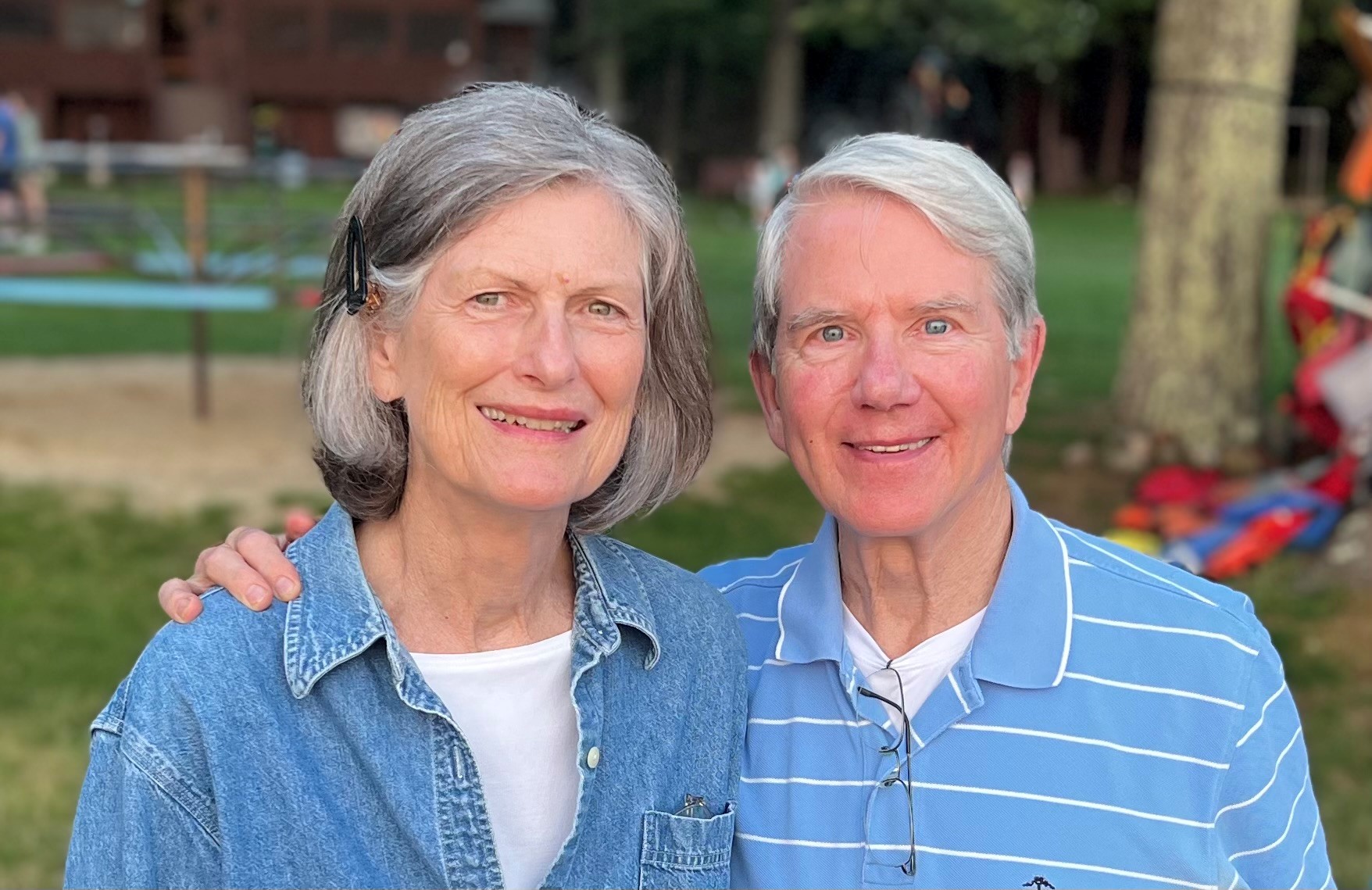
Joan Murray ’68: A Commitment to Creative Thought at Skidmore
Joan Murray’s Skidmore story is one that hits all the highlights of a meaningful liberal arts education. She arrived with one idea about herself and her future, but, after exploration of a range of different disciplines through courses at Skidmore — from math to psychology to art history to English — a lifelong learner emerged with a newfound sense of who and what she could be.
Read more of her story
Murray graduated with a degree in English and credits her liberal education for giving her the flexibility to pursue different career paths throughout her life from finance and technology to teaching and ministry. Joan says, “At Skidmore I learned to think critically, and I gained new perspectives. I learned the tools I needed to change and grow throughout my life.” Her Skidmore education helped her seize opportunities and continuously reframe what success looks like, on her terms.
Murray and her husband, Bob (a Swarthmore graduate), have grown close to — and to admire — the Skidmore of today. Together, they believe in this generation of creative thinkers and are committed to ensuring that today’s and future students will be able to benefit from the same opportunities they have had and cherish. The Skidmore Legacy Society provides an easy and financially rewarding avenue for them to fulfill that commitment.
Through their Individual Retirement Account (IRA), the Murrays support the Skidmore Fund while counting their gift towards their IRA’s required minimum distribution. They’ve also named Skidmore as a beneficiary of their IRA, another meaningful way for them to make a difference.
“Bob and I are so lucky to be in a position to support Skidmore,” said Murray. “It helped shape who I am today and it’s very rewarding to have a part in ensuring that future Skidmore students will benefit from their college experience, where they can learn to think critically and communicate their ideas, while staying open to new ideas and perspectives.”
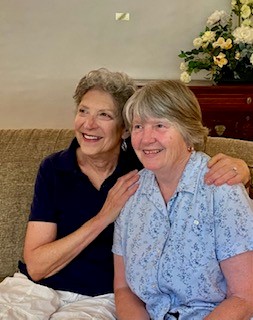
Timi Carter ‘73 (right) and lifelong Skidmore friend Susie Lesser ’73
Timi Carter ’73, a longtime Skidmore volunteer, understands the power of longstanding Skidmore relationships. Timi has served in multiple volunteer roles including Alumni Admissions Contact, Parents Council, and currently, as a Reunion volunteer.
Read more of her story
With a 50th Reunion on the horizon, she looks forward to connecting with classmates, celebrating shared Skidmore experiences, and forging new relationships with fellow alumni and the College.
Timi’s Skidmore story began before she even had Skidmore in mind. The Longmeadow, Massachusetts native had her sights set on a southern school, but after a gap year in London (long before gap years were in vogue), she reconsidered. She realized she missed life in the Northeast too much, with its history, seasons, and quaint communities.
Unlike many alumni who fell in love with Skidmore after a campus visit, Timi’s adoration began with the course catalog, and she applied based on that alone. All these years later, she’s glad she made that leap.
“My four years at Skidmore were full of challenging academics, great personal growth in times of national upheaval, and rich, warm friendships,” Timi says. “The lessons learned and friendships made have sustained me my entire life.”
Timi has translated those fond memories and lifelong lessons into a long-term commitment to ensuring Skidmore is supported for years to come. While she has been a consistent supporter of the Skidmore Fund, her upcoming 50th Reunion inspired her to think about other opportunities to strengthen her commitment to Skidmore.
“When it came time to think about what in life had given me joy, and what I want to support after I pass on, it was clear that Skidmore was one of the most significant influences in my life,” she says. “To that end, I have written in my will that part of my estate be given to Skidmore.”
With the support of her attorney, family, and Skidmore’s Advancement staff, Timi has become a valued member of the Legacy Society. With Skidmore in her will, Timi’s story and personal legacy will live on through the lives of students like her.
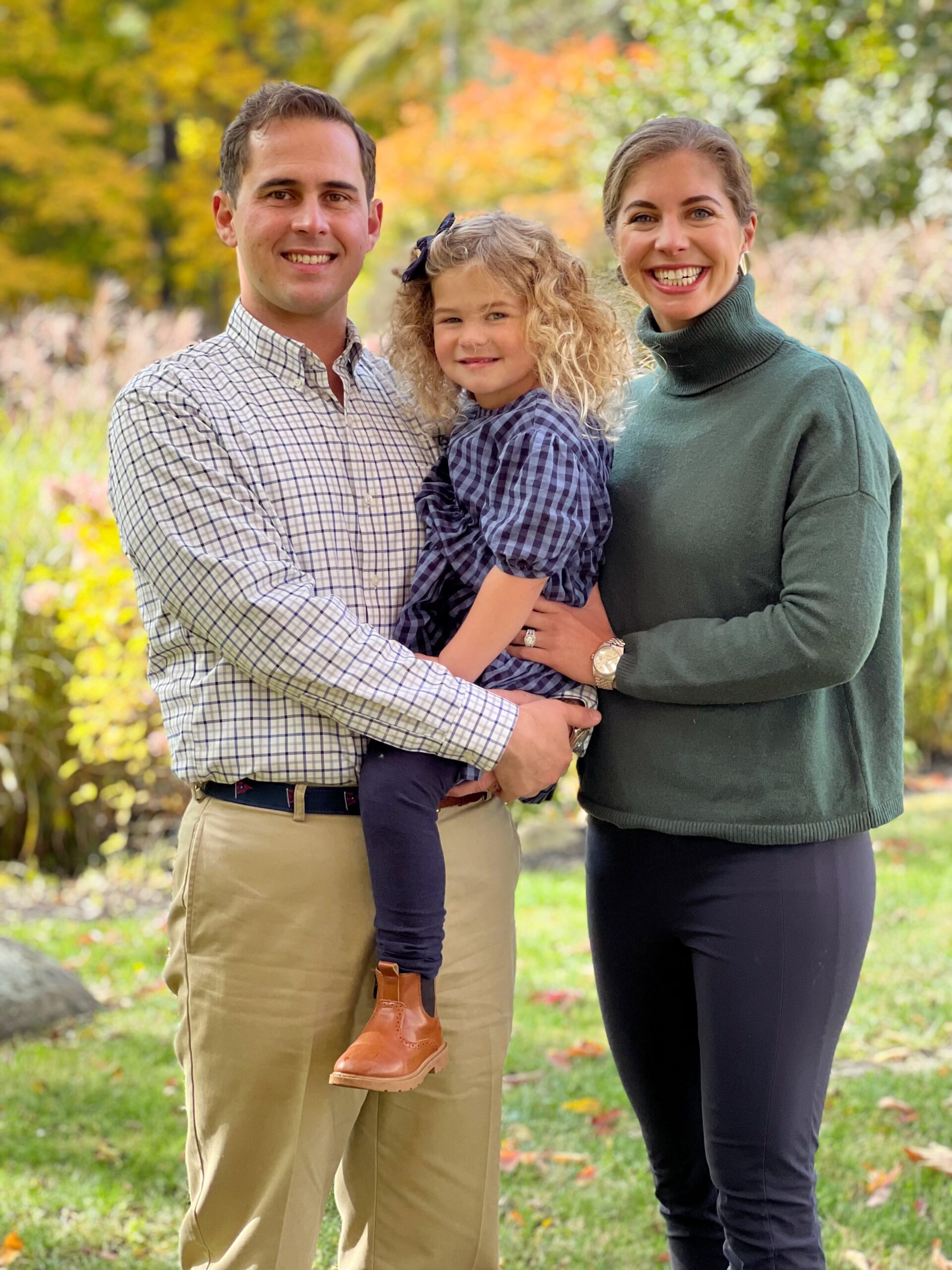
Jerome Mopsik ’06 & Emily Mopsik ’07
Motivated by their deep gratitude, Emily and Jerome have made provisions for the College in their estate plan.
Read more of their story
Emily Mopsik ’07 and her husband, C. Jerome Mopsik ’06, know the value of a Skidmore degree and are deeply grateful for the role the College has played in their lives.
Emily first came to Skidmore as a high school student, working for Wendy Anthony in the College archives. She later transferred to Skidmore, majoring in Education Studies and minoring in American Studies, and has been teaching 2nd grade in Saratoga Springs since graduating more than 15 years ago. Jerome graduated from Skidmore with a double major in Economics/ Management and Business, and founded Even Keel Advisors, providing financial planning and business consulting to veterinarians and their families. Emily and Jerome live in Saratoga with their three-year-old daughter, Lillian.
As an expression of appreciation for their Skidmore experience, Emily and Jerome have generously given their time and talents to Skidmore over the years – she as President’s Society Class Chair for 2007, and he as Class Agent for 2006.
Emily and Jerome both received scholarships from Skidmore, it was natural for them to serve as Palamountain benefit volunteers and they have done so for many years. Their zeal to make Skidmore more accessible, despite a student’s financial circumstances, led them to become regular scholarship and financial aid donors. They donate long-term highly appreciated securities, knowing this tax-smart way of contributing reduces the cost of their gifts and allows them to give more than what they could by making cash gifts.
Motivated by their deep gratitude, Emily and Jerome have made provisions for the College in their estate plan, thereby qualifying them for membership in the Skidmore Legacy Society. When asked about their choice they said, “Joining the legacy society was easy. We added Skidmore as a beneficiary to an existing life insurance policy. Remember you don’t have to leave $100,000 today, you can start with whatever you are comfortable with and then always adjust it down the road. We’re just happy to do what we can now.”
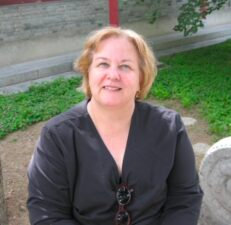
Susan Hinko ’69
Although she made a career in the business world, Susan sees her liberal arts education as the foundation on which she has built.
Read more of her story
As a junior in high school, Susan Hinko ’69 and her father left Queens, New York, for a college visit to Skidmore. “My parents, especially my father, loved Skidmore. They were so happy that I chose to go there, so I wanted to honor their enthusiasm and support.”
That first visit led to a formative college experience. It also inspired Susan to make a gift to Skidmore in memory of her parents through a Charitable Remainder Unitrust (CRUT). Susan and her husband received a substantial income tax deduction when they funded the CRUT, which is now making payments to them for a set number of years. The trust remainder will be used to endow a permanent scholarship at Skidmore in memory of Betty and Joseph Hinko.
Upon reflection, Susan appreciated Skidmore’s all-female environment at the time: Women assumed all the leadership roles and were unfettered by then prevalent understandings of women’s role in society.
“It was an environment that fostered the development of women and their ability to lead, take charge, and fulfill their intellectual and creative promise,” said Susan.
After graduating with a degree in government, Susan lived in Taiwan for two years, where she continued her study of Chinese, which she had begun at Skidmore. Her experiences studying at Skidmore and living alone in Asia taught her self-reliance and how to tackle challenges, giving her the confidence to do anything she wanted to do. “Developing confidence as a woman benefited me dramatically,” explained Susan.
When she returned to the United States, she went on to graduate school to study Chinese literature, graduating with an MA from the University of Michigan in 1977. She then went to Columbia Business School, where she graduated in 1979, and pursued a lengthy finance career on Wall Street until 2018.
Although she made a career in the business world, she sees her liberal arts education as the foundation on which she has built. “Thinking creatively and critically is the real goal of Skidmore, and that is one of the things I was taught while I was there,” she said. “I enjoyed the breadth of the education at Skidmore. It is so important to learn about the humanities — to learn about the world, history, literature, theology, philosophy, music, foreign language, and so on.”
Her decision to support Skidmore through the CRUT was also inspired by a fellow classmate who had funded a bench on campus in her parents’ name. In early 2021, Susan decided she wanted to begin helping students by making Qualified Charitable Distributions (QCDs) from her Individual Retirement Account (IRA). “It’s a way to avoid taxes and provide an immediate benefit to students,” she said. Another benefit of a QCD gift is that it counts toward Susan’s Required Minimum Distribution (RMD) each year.
Her Skidmore reunion sparked her interest in establishing a scholarship for women students studying the humanities. At reunion, her husband had remarked how her classmates were all such incredible, accomplished women.
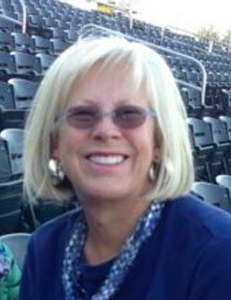
Betty Sandbeck ’72
“Skidmore is the place where my classmates and I learned to think, write, and express a point of view.”
Read more of her story
A longtime supporter of Skidmore College, Betty Sandbeck ’72 is a member of the Presidents Society, and former class and regional volunteer. She has long recognized the doors that have opened and treasured relationships that have been formed because of her experiences at Skidmore, all of which motivate her ongoing support.
Skidmore was the only college that accepted Betty, and “it worked out” perfectly. A summer job at IBM opened the door to a job offer in technical support after graduation — not a common opportunity at the time. Betty gained a wealth of experience and expertise working in the technical sector and management, retiring in June 2007 after 35 years at IBM.
Recently, she considered what more she could do to honor her 50th Reunion. As a first-year student, she formed a strong friendship with her dormitory roommate, Cecilia “Cec” Harding ’72, who tragically died shortly after graduation in 1972. Over the years, Betty continued to remember their time together at Skidmore fondly, and those memories inspired her planned gift.
Betty chose to remember Cecilia by making Skidmore a 10% beneficiary of her IRA (Individual Retirement Account) and supporting Lucy Scribner Library. “Cec loved the library, and I wanted to support one of her favorite spaces — the type of space that students can continue to enjoy now and in the future,” she said. “My hope is that this gift will inspire my classmates to add to my donation in memory of Cec and encourage them to continue to make a difference at Skidmore.”
Betty reflected on the ease with which she made her gift. There was no need to speak with an attorney. She simply updated her IRA beneficiary form and submitted it to her IRA administrator. The added benefit of a planned gift like this is that none of Betty’s IRA will go to pay income taxes because Skidmore is a non-profit organization.
When asked if she had any advice for alumni who are considering a planned gift to the College, she encourages them to think about what their time at Skidmore has meant to them. “Skidmore is the place where my classmates and I learned to think, write, and express a point of view,” she said.
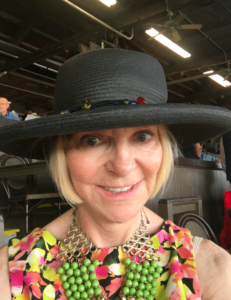
Denise Marcil ’74
“I want the College to remain strong and I want to sustain it in my own small way.”
Read more of her story
Shortly after graduating from Skidmore in 1974, Denise Marcil worked in New York as an editorial assistant when she received an invitation to a local Skidmore Alumni Board meeting. She decided to “just show up”… and she’s been doing it ever since.
“I met so many great people at that first meeting — they were all women at the time,” recalled Denise. “I enjoyed the programs and planning and people so much that I just started volunteering for the College from that point on.”
She has gone on to serve in almost 20 different volunteer positions for Skidmore, including president of the New York Alumni Club, alumna trustee, member of President Porter’s Commission on the 90s, president of her class, and Advisory Council member for Skidmore’s Legacy Society.
Denise says her engagement with the College through the years has been fueled by the people she has met along the way, including alumni, students, staff and professors — valuable connections that have led to great friendships. “I’ve grown and benefitted from all the volunteer work that I’ve done, developing terrific leadership and interpersonal skills. So, honestly, I’ve received more than I’ve given back.”
Those leadership and interpersonal skills, along with her talents honed as a professional literary agent, made Denise an invaluable member of the Legacy Advisory Council. Through her work on the Council, Denise was exposed to the myriad ways she could extend her financial commitments to the College.
“Being on the Council and helping to develop gift planning communications, I started to think about how I myself could make a more significant contribution in my Reunion year,” recalled Denise. “Then reading about someone else, a contemporary who had made a recent gift, led me to a decision. It became clear that a charitable gift annuity was a way that I could make a fairly decent gift, yet also receive lifetime income in return and enjoy a bit of a tax break. It was a way that I could double what I had been giving annually.”
Beyond volunteering, Denise’s charitable gift annuity with Skidmore allows her to support access to a world-class education. “I want the College to remain strong, and I want to sustain it in my own small way. It’s of such value to me and so many other alumni that it continues to thrive and improve. Knowing, for instance, that the academic standards are higher and more rigorous now — that growth is important to me.”
“My gift annuity is just one more way that I can continue to show up for Skidmore.”
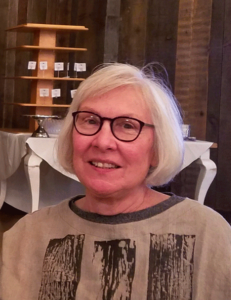
Susan Roman ’70
When it came time to think about her legacy and how to pick and choose among future beneficiaries, Skidmore was an easy choice.
Read more of her story
After growing up in a working-class community in Connecticut, Susan Roman ’70 packed her bags in fall 1966 to study English at Skidmore College. Those four years, in the late 1960s, were a time of revolution — in politics, music and society at large. In many ways, Skidmore reflected those changes. As a first-year student, she had a curfew and wore skirts to dinner as required. By the end of her senior year, she was able to embrace open dorms, no curfew and jeans as a fashion staple.
“Skidmore was a formative experience that helped me to learn adaptability,” recalled Susan. “Learning not only to adapt, but to embrace change has served me well.”
After graduation, Susan wasn’t sure what she wanted to do. She would eventually realize that her driving force, both professionally and personally, was to be involved with community institutions that support people. Although she may not have fully realized it then, her Skidmore experience laid the foundation for her desire to affect positive change wherever she could.
Susan initially worked in the urban renewal department in West Hartford and Waterbury, Connecticut. Later, she and her husband moved to Hartford, where she worked for a neighborhood development corporation. She ended her career at Literacy Volunteers of Greater Hartford, a large adult education program for English-language learners. While growing these important nonprofit organizations, she was exposed to a variety of people different from herself — familiar territory from her formative experience at Skidmore.
Susan’s commitment to community continues in retirement from the small Vermont town of West Minster, where she now resides. “I value my ability to support local community institutions that have affected my life and the life of the community,” she said, “whether it’s the church, the library, the local land conservation group or Skidmore.”
When it came time to think about her legacy and how to pick and choose among future beneficiaries, Skidmore was an easy choice. “Establishing a bequest in my will for Skidmore was simple to do,” said Susan. “The fact that my future gift intention also supported the fundraising effort for my 50th Reunion was an added incentive.”
“It’s important to me to help preserve a valued institution that supports its students and the Saratoga community,” added Susan. “Skidmore is really important to the lifeblood of Saratoga. The city’s transformation that started after the 1970s has been really remarkable, and I think having a school like Skidmore as a community pillar was critical to that revitalization.”
Reflecting on what Skidmore is really all about — for her and for future generations — Susan summed it up beautifully: “Skidmore students arrive on campus as raw material and come out the other end as citizens of the world who can make a difference.”
Join a Giving Society
Together we can do so much.
Join a community of people who share your passion for Skidmore’s educational mission by becoming a member of one of our giving societies.
